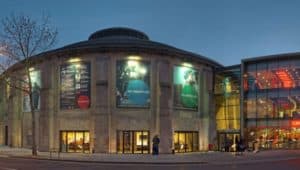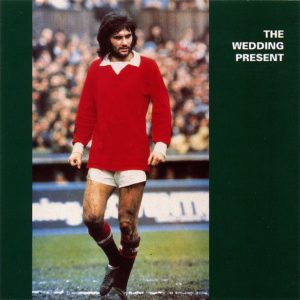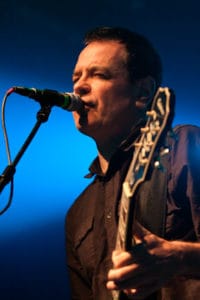The Wedding Present: The 13th Floor Interview
David Gedge has been leading The Wedding Present for over 30 years and he’s getting ready to lead the band to New Zealand for a five-date touring beginning in Auckland with a show at The Kings Arms on July 4th.
The band is celebrating the 30th anniversary of the release of their acclaimed debut album George Best...by releasing a new version, re-recorded in Chicago by Steve Albini.
The 13th Floor’s Marty Duda tracked down David Gedge just after he and The Wedding Present played a show at London’s iconic Roundhouse. Listen in as Gedge reveals his feelings about contemporary pop music and why he felt the need to re-record George Best…
Listen to the interview with The Wedding Present’s David Gedge here:
Or, read a transcription of the interview here:
MD: You did a show in The Roundhouse in London; is that right?
DG: We did, yeah, on Saturday night.
MD: How did that go?
 DG: It was alright. It was a big one, basically: there were a few thousand people. It’s a nice venue. I don’t know if you’ve ever been there, as the name implies, it’s actually round. I think it used to be a railway turntable, where they turned engines around… it’s this huge, round building; so, even though it has 3000 capacity, it doesn’t feel that big, really, because the stage takes one third of it, and you’re facing the whole width of the room very quickly, because of the way that the circle expands. It actually felt quite… not intimate, but it didn’t feel like you were in a vacuous, big hole; so, it was a nice concert.
DG: It was alright. It was a big one, basically: there were a few thousand people. It’s a nice venue. I don’t know if you’ve ever been there, as the name implies, it’s actually round. I think it used to be a railway turntable, where they turned engines around… it’s this huge, round building; so, even though it has 3000 capacity, it doesn’t feel that big, really, because the stage takes one third of it, and you’re facing the whole width of the room very quickly, because of the way that the circle expands. It actually felt quite… not intimate, but it didn’t feel like you were in a vacuous, big hole; so, it was a nice concert.
MD: I think I’ve driven past there once, but the only big venue that I’ve been to, in London, is Hammersmith.
DG: Oh yeah…! The weird thing is – for me – that we’ve just been playing George Best – our first album – live, and to me, that works better in a more intimate venue: I think it’s not a particularly big sound. I think when we do more of the rock stuff – and it’s got this bass and the big drum sound and the big guitar sound – that works in a big setting, but I think George Best is more of a punky, frantic album, and that works in a more intimate venue; but, having said that, I thought it was fine, because of the shape of it: it didn’t really get lost in there; so, it worked out okay.
MD: And you’re going to be in an even more intimate place when you get to Auckland; so, that’s something to look forward to.
DG: Obviously, we’ve played there before, a couple of years ago, and we’re looking forward to that. It’s a lot smaller, obviously, than the places we play over here, but those concerts are often the better ones, because it’s a bit more intimate and you get to see the people and they get to see you: it’s not like you’re in some huge room, where you’re about half a mile away from the band; so, we’re looking forward to it.
MD: And you’re doing the George Best thing here as well; is that right?
 DG: No, we’re not, because we did some George Best gigs last time we were there anyway…. We had a new album out last year, called Going, Going; so, the set… is going to be a varied set with a few songs… off last year’s album, and a few George Best ones as well, because it’s the thirtieth anniversary, and then, I suppose, another ten or fifteen songs from our ex-set. That’s the weird thing: there are so many songs, because the bands been going for thirty odd years – we have, literally, about two hundred and fifty tracks now… – and honing that down to twenty is bloody difficult…. Whatever you do at the end of a show – it can be really amazing gig – and somebody will come and say, “It’s great, but why didn’t you play ‘so and so’?” I didn’t play one of the other two hundred and thirty that we didn’t play as well. We can’t play them all; so, that’s just the way it is, really. It’s a nice problem to have, in some respects, because it means we’ve got an extensive collection of songs. Honestly, I don’t actually do the set lists anymore, because it is quite hard work… our drummer does it now – Charlie – because he’s been in the band for ten years; so, he understands the way it goes, and he’s taken on the role of the set list organiser; so, I’m very happy with that!
DG: No, we’re not, because we did some George Best gigs last time we were there anyway…. We had a new album out last year, called Going, Going; so, the set… is going to be a varied set with a few songs… off last year’s album, and a few George Best ones as well, because it’s the thirtieth anniversary, and then, I suppose, another ten or fifteen songs from our ex-set. That’s the weird thing: there are so many songs, because the bands been going for thirty odd years – we have, literally, about two hundred and fifty tracks now… – and honing that down to twenty is bloody difficult…. Whatever you do at the end of a show – it can be really amazing gig – and somebody will come and say, “It’s great, but why didn’t you play ‘so and so’?” I didn’t play one of the other two hundred and thirty that we didn’t play as well. We can’t play them all; so, that’s just the way it is, really. It’s a nice problem to have, in some respects, because it means we’ve got an extensive collection of songs. Honestly, I don’t actually do the set lists anymore, because it is quite hard work… our drummer does it now – Charlie – because he’s been in the band for ten years; so, he understands the way it goes, and he’s taken on the role of the set list organiser; so, I’m very happy with that!
MD: I can imagine after a while, it must be a chore; especially when you have so much to choose from, and you know you’re going to disappoint somebody.
DG: Yeah! And you’ve got to bear in mind what we played last time – have we played the same set that we played a couple of years ago – so, you’ve got to keep a record of that. I think he’s got a little database now with all the set lists on it… and also, the set’s got to flow. It’s not just, “Let’s play these four songs that we want to play,” they’ve got to fit into an overall set that’s got a beginning and an end; rather like putting an album together, in a way: it’s got to have fast bits and loud bits and quiet bits. It’s got to hold the attention. It sounds like you’re telling a story, really; so, you can’t just throw it all in. There’s a lot to think about, really.
MD: You’ve been pretty active in the studio – in the last few years, especially – so, I imagine you want to concentrate on the newer stuff, you have a double album and an EP, and there’s a new version of George Best that’s about to be released….
DG: Totally, yeah! There are so many different things. You’ll come up with a set list, and I’ll say, “That’s great, but have you forgotten about this?” and then we’re like, “Oh, yes!” We have been very active over the last few years; so, there’s a lot of stuff to bear in mind.
MD: I’m curious about the re-recording of George Best, because it’s not something that most bands do: to go back and revisit and album – especially something that’s considered a classic in there catalogue – and redo it. My understanding is that you went into the studio with Steve Albini in 2008, and it’s about to be released sometime later this year; is that right?
DG: Yeah. Well, to be honest, it wasn’t something that I actually planned either. It was just because we were in the studio with Albini recording El Rey… and, typically with Albini, it was all finished very quickly, because we just set up and played live, recorded it… and bang, bang, bang it’s done; so, we had half a day left in the studio, and we were just thinking, “It seems a shame we’re here all the way in Chicago. We’ve already paid for the studio, we’ve got all the gear set up… literally, we could record more stuff.” Funny enough, we’d just played George Best, live, recently – it was the twentieth anniversary the year before – so, we all knew George Best, and we thought, “Okay, let’s just play George Best live.” It’s only forty minutes long anyway. I don’t think we did any redos because we knew it so well so we just sort of blasted through it so, we just turned the tape machine on and played it. It is like a live version of it, in a way, but in the studio; and we just thought, “Why not?” And, to be honest, I kind of forgot about it, because El Rey came out, and we did that and moved on; and it was at the back of my mind, “Oh yeah! We’ve got that recording of George Best that we never did anything with,” and then this year, being the thirtieth anniversary, I thought it felt obvious that this was the time to mix it and bring it out. I think it’s going to be out in July. We have actually got a couple of CDs that we’ve been signing at concerts. I think, officially, it’s not out; but for emergencies, yeah.”
MD: Obviously, no one’s heard it yet; so, how would you say it sounds? Does it sound pretty much like what they would have heard live, or is there something added, taken away, sound quality wise? How would you describe it?
DG: To me, it does sound like a well recorded live concert…. I think one thing people will be possibly challenged by, is the fact that it’s not really an Albini sounding record. I think where you hear the Albini sounds, is usually when there’s space, and you hear massive drum sounds, you hear this massive guitar and the big fat bass; and George Best isn’t that kind of record, really…. There’s none of the space or room that he is so skilled at capturing on a recording. I mean, the guitar sounds kind of Albini, I suppose, because they’re a bit more ‘rocky’, I guess; but it doesn’t sound like a typical Albini recording. I’m not even sure what that means anymore, because he does record a lot of different types of groups, these days. I’m really interested to see what people think. The people, who have heard it so far, think it’s good. It’s just a different interpretation of it, really, I suppose.
MD: Speaking of reinterpretations: a lot of buzz, these days, has been about the remixing of Sgt. Pepper, which was released fifty years ago and having its anniversary, and that was considered to be a concept album; and you’ve kind of gone that route, as well, with the previous album, Going, Going. I’m wondering if Sgt. Pepper is any kind of milestone or touchstone for you, when you’re thinking about what you’re doing with The Wedding Present.
 DG: No, not really. Weirdly, it’s one of my least favourite Beatles records…. I’ve read this before: some people talk about Sgt. Pepper, and often they’ll say, “It was a remarkable LP.” “It was ahead of its time.” “They reinvented the recording process,” etcetera, etcetera; but, it’s one of my least favourite albums from the Beatles! I’m in that group of people. It’s not an album that I go back to often. I kind of admire it, but I think there are so many other brilliant Beatles records…. With Going, Going, I didn’t want it to be a concept album, because to me, ‘concept’ conjures up these images of 1970s prog rock… and I remember that from being a kid – although, I did like it then, I was thinking, “Maybe it’s not for me.” – but the way the concept has evolved: there’s no denying that it is a concept album, because there’s a theme, the music holds together, and lyrics work together, there’s a story; but then I thought, “Maybe all albums are concepts, in a way,” because with any album, you go into the studio, you’re normally working with one or two people in that studio, with a collection of songs written over a period of time by a certain line up; so, it’s bound to have a feel or a mood anyway, I think….
DG: No, not really. Weirdly, it’s one of my least favourite Beatles records…. I’ve read this before: some people talk about Sgt. Pepper, and often they’ll say, “It was a remarkable LP.” “It was ahead of its time.” “They reinvented the recording process,” etcetera, etcetera; but, it’s one of my least favourite albums from the Beatles! I’m in that group of people. It’s not an album that I go back to often. I kind of admire it, but I think there are so many other brilliant Beatles records…. With Going, Going, I didn’t want it to be a concept album, because to me, ‘concept’ conjures up these images of 1970s prog rock… and I remember that from being a kid – although, I did like it then, I was thinking, “Maybe it’s not for me.” – but the way the concept has evolved: there’s no denying that it is a concept album, because there’s a theme, the music holds together, and lyrics work together, there’s a story; but then I thought, “Maybe all albums are concepts, in a way,” because with any album, you go into the studio, you’re normally working with one or two people in that studio, with a collection of songs written over a period of time by a certain line up; so, it’s bound to have a feel or a mood anyway, I think….
MD: Speaking of pop music in general: I read somewhere that you consider yourself a fan of pop music – I think you cited Abba as somebody that you enjoy – and I’m wondering what you think of contemporary pop music? Because – at least to me – it sounds quite a bit different, and serves a different purpose than pop music in the ‘70s or ‘60s did.
DG: Yeah, I think you’re totally right. I think it’s definitely a different culture now, with technology and internet… there’s X Factor, or whatever shows are on now. It’s definitely created a different type of pop music. It’s not particularly to my taste, I don’t think, but that’s not to say it’s… not bad, it’s just a different way of doing stuff now. And there’s always an alternative to pop music as well; I think that’s pretty healthy. I think one of the problems is, because there’s no money to be made anymore by signing recorded music – not even because people are illegally downloading anymore: it’s streaming now: you can hear anything you want for free, basically… wherever you are, as long as you’ve got an internet connection – and I think, because of that, record companies have had to change their models; it’s more about squeezing as much money out of an artist as they can now…. New pop stars have got a different… a soon as they’ve written a song, they want to be on social media: they want to go on Facebook, they want to go on Twitter; and I think, in the ‘60s… we didn’t have that same pressure; it was just a case of making great records, and… all the good ones became hits; so, the whole thing was a different world. I do feel sorry for young musicians. I think, for a band like The Wedding Present: we’ve been going for a few years, we’ve got an established group of fans who still want to buy records – they want to buy CDs and LPs – I think they still feel a bit guilty about streaming; so, it’s not quite as hard for us. I think we take a tangent off from the way it’s gone; but for a new band forming now: I hate to think how they’ll manage to attract enough income to actually sustain it, because it’s just a different world really.
MD: And the other problem seems to be that once they do get something out, they have to stay on the road forever, in order to actually generate any income, and they don’t have time to go back and write their next album, because as soon as they get off the road, their money stops.
 DG: We’ve worked with various people – some of whom are tour managers – and they say that whenever they get a new band, that their tour managing, it tends to be people who have got money in the first place: you know, they’ve got rich parents… or a sponsor, or something. I think, in some ways, we’re excluding a lot of the potential pop stars, song writers – whatever you want to call them – because they can’t afford to give up their day job, basically; because they’ve got to work in the bar, or they’ve got to work in a shop, in order to pay their rent, and then it gives them a few hours a week to be in a band. It’s not a new thing, in a way, because technology’s has always been evolving since rock & roll was invented, I suppose: there are always people who write songs, there are always people that want to make recordings, people that want to play gigs; and I think they just find a way of doing it, really; it’s just a bit harder for them now.
DG: We’ve worked with various people – some of whom are tour managers – and they say that whenever they get a new band, that their tour managing, it tends to be people who have got money in the first place: you know, they’ve got rich parents… or a sponsor, or something. I think, in some ways, we’re excluding a lot of the potential pop stars, song writers – whatever you want to call them – because they can’t afford to give up their day job, basically; because they’ve got to work in the bar, or they’ve got to work in a shop, in order to pay their rent, and then it gives them a few hours a week to be in a band. It’s not a new thing, in a way, because technology’s has always been evolving since rock & roll was invented, I suppose: there are always people who write songs, there are always people that want to make recordings, people that want to play gigs; and I think they just find a way of doing it, really; it’s just a bit harder for them now.
MD: … I read somewhere that you did something rather unusual: did you move your show, that’s scheduled in Perth, to accommodate Undertones fans?
DG: Oh, yeah! I was actually at a concert about two or three weeks ago in England, and there was a fellow there from Australia. I was chatting to him, and he said he’s from Perth, and I said, “Oh, well I’ll see you in a few weeks then,” and he said, “Ah, no you won’t, because I’ve already got tickets for The Undertones.” I was like, “What!” and I got on to our promoter straight away, and he didn’t even realise. He said, “Oh God, yeah! We’ve actually got the same night.” I just thought, it’s it’s stupid really: it’s the first time that we’ve been to the west coast of Australia, and it’s not going to be identical fans, but a very large crossover for people who are fans; so, we just decided to move our show…. Well, it’s not purely out of selfless reasons: we were just thinking that it’s going to affect our ticket sales, it’s going to affect their ticket sales; what’s the point? Let’s just move it, and then you’ve got the option of going to both. We just thought it would be a sensible way of dealing with it. I mean, it’s cost me a bit of money, obviously, to arrange that, but I think it would be worth it, in the end.
MD: It seems very fan friendly.
DG: Yeah, I know, yeah. I probably won’t be as happy about it on that Saturday night when I’ve got to pay for the hotel, and everything. But I’ll probably go to the gig, and enjoy The Undertones.
The Wedding Present tour New Zealand from July 4th – July 8th.
Click here for more information and tickets.
- New Music Friday: 13th Floor New Album Picks: April 19, 2024 - April 19, 2024
- JessB – Talk Of The Town: 13th Floor New Song Of The Day - April 19, 2024
- The Bacon Brothers – Ballad Of The Brothers(Forosoco/Forty Below) - April 18, 2024
